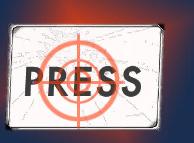9 warnings to journalists in 7 days
Belarusian mass media have encountered increasing harassment following a terrorist act in Minsk metro on 11 April, with 9 warnings addressed to individual journalists and editorial boards within just 7 days between 12 and 19 April following the blast.
On 12 April, the General Prosecutor’s Office issued a warning to Aliaksandr Starykevich, editor-in-chief of the Salidarnasts online newspaper, for “disseminating ungrounded information on the tragic events in Minsk metro.” Mr. Starykevich was the first of Belarusian journalists to publish all possible versions of the explosion. However, the prosecuting authorities considered his publications “ungrounded data and speculations aimed at discrediting Belarusian society and State.”
On 14 April, Anatol Sanatsenka, editor of the Babruiski Kurier newspaper, was summoned for “a conversation” to local prosecutor’s office. However, he refused to do so without an official writ. On 18 April, Mr. Sanatsenka received an official warning by post; the warning was said to be linked to his blast-related publication in a blog at www.belaruspartizan.org.
On 14 April, the Information Ministry addressed a warning to the UzHorak regional newspaper for alleged technical errors in its latest issue, as well as a failure to notify the Ministry after a new chief editor was elected.
On 14 April, the Information Ministry warned the Nasha Niva independent newspaper for a publication, claiming that one of the victims of 11 April blast remained under debris until late evening. According to the Ministry, this infringed public interests and discredited the state bodies that were involved in rescuing the injured. Meanwhile, the publication was based on a witness’s words, whose name was given in the article.
On 15 April, the Ministry of Information addressed a warning to the Narodnaya Volya independent newspaper for “dissemination of false data that insult the business reputation of Belarusian state TV channel 1. The fact was said to be established by a decision of the Supreme Economic Court of 13 April, who considered the channel’s claim against Narodnaya Volya’s deputy editor-in-chief Mrs. Sviatlana Kalinkina, after the journalist named the state-run TV channel “Goebbels TV”.
On 18 April, Nasha Niva editor-in-chief Andrei Skurko was interrogated by the KGB. As a result, he was warned for disclosing case materials, relating to the 11 April Minsk blast. The following day, the KGB agents visited Nasha Niva office and ordered several videos covering the terrorist act to be removed from the newspaper’s web-site.
On 19 April, Siarhei Niarouny, editor-in-chief of the Volny Horad Krychau local newspaper, was officially warned by the prosecuting authorities for criticism of state officials’ actions following the Minsk metro blast.
On 19 April, Nasha Niva received another warning from the General Prosecutor’s Office for a publication, where a former military colonel said the explosion could have been staged by pro-government forces.
On 20 April, the Ministry of Information addressed a warning to the ARCHE magazine for failure to state the editor-in-chief’s patronymic name in the magazine’s output data, as well as a number of other minor errors.
On 20 April, the Belarusian Association of Journalists released a statement entitled “Stop Persecution of Our Colleagues!” The statement believes that “the governmental authorities attempt to make use of any cause in order to make silent the few remaining free voices in Belarusian media field.” “Unfortunately, the tragic event of April 11th in Minsk wasn’t an exception to the rule either”, says the appeal.
Apart from that, the statement mentions a number of illegal detentions and convictions of journalists following the terrorist act, together with numerous DDos attacks on independent Internet resources and criminal charges brought against eight BAJ members, seven of them being involved in the 19 December “mass riot” case.


















